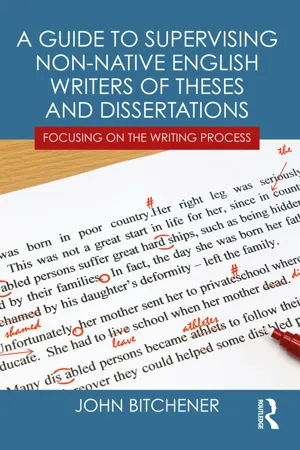
A Guide to Supervising Non-native English Writers of Theses and Dissertations
Focusing on the Writing Process
- 166 pages
- English
- ePUB (mobile friendly)
- Available on iOS & Android
A Guide to Supervising Non-native English Writers of Theses and Dissertations
Focusing on the Writing Process
About this book
Focused on the writing process, A Guide to Supervising Non-native English Writers of Theses and Dissertations presents approaches that can be employed by supervisors to help address the writing issues or difficulties that may emerge during the provisional and confirmation phases of the thesis/dissertation journey. Pre-writing advice and post-writing feedback that can be given to students are explained and illustrated.
A growing number of students who are non-native speakers of English are enrolled in Masters and PhD programmes at universities across the world where English is the language of communication. These students often encounter difficulties when writing a thesis or dissertation in English – primarily, understanding the requirements and expectations of the new academic context and the conventions of academic writing.
Designed for easy use by supervisors, this concise guide focuses specifically on the relationship between reading for and preparing to write the various part-genres or chapters; the creation of argument; making and evaluating claims, judgements and conclusions; writing coherent and cohesive text; meeting the generic and discipline-specific writing conventions; designing conference abstracts and PowerPoint presentations; and writing journal articles.
Frequently asked questions
- Essential is ideal for learners and professionals who enjoy exploring a wide range of subjects. Access the Essential Library with 800,000+ trusted titles and best-sellers across business, personal growth, and the humanities. Includes unlimited reading time and Standard Read Aloud voice.
- Complete: Perfect for advanced learners and researchers needing full, unrestricted access. Unlock 1.4M+ books across hundreds of subjects, including academic and specialized titles. The Complete Plan also includes advanced features like Premium Read Aloud and Research Assistant.
Please note we cannot support devices running on iOS 13 and Android 7 or earlier. Learn more about using the app.
Information
1
Introduction
The Writing Challenges that Non-native Dissertation Students Can Encounter
Why Do Some Non-native Writers Encounter Dissertation-Writing Challenges?
Approaches to Overcoming the Writing Challenges of Non-native Dissertation Students
Pre-writing Advice and Post-writing Feedback to Address the Writing Challenges of Non-native Dissertation Students
Pre-writing Advice
What is Pre-writing Advice?
Who Gives the Advice?
When Is the Advice Given?
What Advice Is Typically Given to Dissertation Students?
Post-writing Feedback
What Is Post-writing Feedback?
Who Gives the Feedback?
When Is the Feedback Given and What Is Its Focus?
Table of contents
- Cover
- Title
- Copyright
- CONTENTS
- Preface
- Acknowledgements
- 1 Introduction
- 2 Advice and Feedback in the Provisional Enrolment Period
- 3 Advice on the Selection of Content for Dissertation Chapters
- 4 Feedback on the Selection of Content for Dissertation Chapters
- 5 Advice and Feedback on the Creation of Argument in Dissertation Chapters
- 6 Advice or Feedback on the Coherence of Dissertation Arguments
- 7 Advice and Feedback on the Writing of Other Texts During the Dissertation Journey
- Appendices
- References
- Index